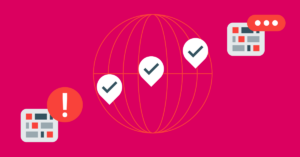Top Brokerage Accounts for Beginner Stock Traders
Brokerage accounts have changed significantly over the years… so what makes a good brokerage account today for beginners? Read on to find out what makes a good investment account for new investors today.
A good brokerage account for beginners should have low trading fees, if not free, low account minimums and diverse investment offerings like stock, bonds, ETFs and mutual funds.
We’ll walk your through the options for the best discount broker options so you can decide which one best fits your needs.
12 Best Brokerage Accounts for Beginners in 2023
If you’re a US resident looking for a competitive brokerage account to facilitate your trades, your options now run into the hundreds of providers.
On the upside, this allows you to pick a platform that most aligns with your trading goals. That said, finding the right platform is no walk in the park.
In this article, we will divulge the best brokerage accounts that are available in the US market looking at the types of financial instruments offered, reputation, user experience, and what additional features each broker brings to the table.
1. TD Ameritrade
TD Ameritrade is one of the largest and most established online brokers in the US. The platform is filled with intuitive features that adapt itself to traders of all sizes.
It offers one of the largest selection of investment products, including stocks, mutual funds, ETFs, forex, and cryptocurrency. There is also an assortment of derivative products – such as options and futures.
If you are a long-term investor, you can also benefit from dividend reinvestment tools, bonds, and fully-managed portfolios.
Perhaps, most importantly, TD Ameritrade allows you to trade US-listed stocks, ETFs, and options commission-free. Moreover, there is no specific minimum needed to open your account and no inactivity fees apply. You can also access market data, news, and analysis for free.
TD Ameritrade is particularly known for its efficient trading platform – ‘thinkorswim,’ that seamlessly works across web, desktop, and mobile interfaces. You can access trading tools, place complex orders, and access all features regardless of which device you use.
The platform has also been designed with beginner traders in mind, and this is where it truly shines. Using AI, the broker will intuitively suggest appropriate content for you and your skillset.
You can gain access to a personalized learning experience with articles, online courses, webinars, tutorials, and more.
2. Fidelity
Fidelity is continuously evolving to become one of the most well-rounded brokerage accounts in the US investment space. To begin with, it is not merely a brokerage firm. The platform has features that address almost every concern of investors of all kinds – with a focus on lowering trading costs and quality of service.
Whether you want to trade stocks, ETFs, or options, or go for a long-term investment for college savings, health savings, or retirement plans – Fidelity has you covered.
One of the most impressive features of Fidelity is its ‘Fractional Trading’ tool. This allows you to buy only a fraction of a share instead of needing to purchase a full stock.
For instance, let’s say Tesla stocks are priced at $800 per share. If you want to limit your stake in Tesla to $100, you get 1/8th of one share – allowing you to gain access to your chosen equity without needing to break the bank.
Like other competitive platforms, Fidelity has also reduced its commission on stocks, options, and ETFs to 0%
You can trade directly on Fidelity’s native platform, Active Trader Pro – which combines extensive research and asset screeners, and this integrates well with mobile trading.
Both beginner and experienced traders can also take advantage of educational tools that range from webinars, coaching lessons, newsletters, and a dedicated Fidelity Learning Center.
3. Charles Schwab
Charles Schwab is a full-fledged brokerage account that gives you access to over 4,000 mutual funds, among ETFs, stocks, options, and other investment products.
You can choose to trade based on your own research or sign up for the Personalized Portfolio Builder. This allows you to create a diversified portfolio that fits your trading goals.
Following the path of other prominent online brokers, Charles Schwab has also committed to charging zero commission on all US-listed stock and ETF investments. You will also avoid having to pay inactivity fees and you can trade without any specific account minimum.
When it comes to research tools, Schwab’s is almost hard to beat in this department. Its trading platform StreetSmart Edge® allows you to trade through mobile, desktop, or web browsers.
In addition to native market insights offered by in-house experts, you can also take advantage of financial analysis provided by Credit Suisse, Morningstar, MarketEdge, and others. You can also find potential trading opportunities using advanced screeners.
In case you want to benefit from fractional shares, the Schwab Stock Slices™ tool allows you to start investing with as little as $5.
To give you a glimpse of its technological advancement – Charles Schwab also integrates with voice assistants such as Google Assistant and Amazon Alexa. You can simply ask for stock or market developments and get updates on your watchlist!
4. E*Trade
After being held back by high commission rates, E*Trade went through a revamp in 2019 to appeal to the new-age retail investor. Today, E*Trade offers you three trading platforms and two mobile apps – combining the best of usability and depth.
In fact, according to popular opinion, E*Trader’s mobile app is much more intuitive and easy to use than its web version. E*Trader Pro is a platform more suited for professional traders, with numerous customizable options, watchlists, and advanced screeners.
Its zero commission offering extends to stocks. ETFs, and futures. You can also trade options at only 65 cents per contract and futures at $1.50.
E*Trade’s paper trading capabilities are also extensively used by investors to backtest their strategies. There are also five third-party research reports accessible on the site. You can get data from individual analysts, as well as daily insights from the in-house counsel.
One area where E*Trade falls behind is in the user experience of its website, where it could be tricky at first to navigate your chosen asset class. But, once you get the hang of it, you can quickly access your chosen feature without too much hassle.
5. Interactive Brokers
Interactive Brokers primarily serves seasoned and institutional traders. That said, the brokerage firm is constantly evolving to accommodate the expectations of retail investors, too.
The online broker offers accounts in two variations. The IBKR Lite is tailored for retail clients – where you can trade any US-listed stock and ETF at zero commissions, no inactivity fees, and no account minimums. The IBKR Pro, on the other hand, is completely equipped for sophisticated traders.
Compared to other US online brokerage accounts, Interactive Brokers also has an unparalleled range of investment products. Besides giving direct access to international exchanges, traders can also choose from a variety of fixed income products that include several European bonds.
IBKR’s Client’s Portal can function as a one-stop web application to facilitate research, place trades, and gain access to market data.
If you prefer a desktop application to trade, Trader Workstation comes with lots of flexibility. There is also a mobile app through which you can easily place trades and monitor your account.
In its efforts to offer educational resources, IBKR has set up several features that can fully equip a trader in the ways of the market. You can essentially sign up as a student and gain real-life trading experiences through the labs and campus functionalities.
6. Merrill Edge
Considered as a brokerage account, Merrill Edge combines the best of robust technology and tools for traders and investors. However, the platform truly shines when you take into account its integration with the Bank of America.
Consequently, Merrill Edge is best suited for users of the aforementioned bank. You can sign in to both accounts with a single login, process transitions with ease, as well as monitor your trading funds effortlessly.
Moreover, if you have a combined balance of over $20,000 – you also get access to numerous discounts on fees charged by the brokerage.
If you look past this advantage, Merrill Edge comes across as a decent and straightforward platform. The trading experience is smoothly designed and allows you to trade options and ETFs at no commission. There are no inactivity fees, or any account minimum requirements.
You can make use of the two innovative research tools – the Dynamic Insights and Idea Builder, to find investment opportunities in the market and customize your brokerage account to your liking.
You can filter investment options through ideas, such as climate change, high yielding, and more. While the benefits are extensive, Merrill Edge trails behind significantly when it comes to investment products.
If you are looking to trade, you will be limited to equities, options, ETFs, and bonds. You have no access to cryptocurrencies or futures.
7. TradeStation
If you are a technical trader, then TradeStation offers every switch and indicator you might need. The brokerage account takes pride in its array of technical analysis tools and charting applications that particularly appeal to seasoned traders.
TradeStation GO – the official trading platform of the brokerage account – facilitates zero commission trading of stocks, ETFs, futures, and options. Cryptocurrency trading is accessible through another platform called TradeStation Crypto.
However, this platform does not feature the full functionalities of GO and charges you a commission fee that depends on your account balance.
While the broker offers several innovative technical tools, you will also need a bit of coding knowledge to take full advantage of them. TradeStation has introduced an Easy Language – which is a crossover between HTML and SQL that you can use to modify technical indicators based on your strategies and apply them to charts.
Although learning materials are offered, the more extensive ones are available only at an extra cost, which is on the expensive side.
In simple terms, while TradeStation is decent in most areas, it is a good fit for professional traders who are well-versed in the ways of technical analysis.
8. Robinhood
The first thing you will notice about Robinhood is how simple and efficient the user experience is. The platform is fairly easy to navigate – translating to the fact that it is one of most popular brokerage accounts for newbie traders.
In its early days, Robinhood stood apart as one of the few brokers that offered commission-free trading on stocks, options, ETF, and cryptocurrency markets. It also has no minimum account requirements.
The recent addition of fractional shares can also be added to its list of benefits.
However, Robinhood has failed to keep up with the features and technical resources offered on other online brokerage accounts. For instance, the platform does not offer mutual funds or bonds.
There are also very few learning resources available for traders, even at a beginner level. Moreover, there are absolutely no technical indicators, market analysis tools, or charts offered.
In summary, if you are a beginner hoping to access the investment markets at a low cost, then Robinhood can meet your needs. But it is likely that you will soon outgrow its limited features.
9. ZacksTrade
While most online brokerage accounts now offer trades at zero commissions, ZacksTrade has not reigned in its trading fees.
The commission rates range from one cent per share to 1% of the trade value, depending on the asset. There is also an account minimum set at $2,500.
But do not let trading fees alone lead you into overlooking this brokerage platform. ZacksTrade offers tons of features that can easily make up for these additional costs.
Its platform is geared towards active traders and investors who prefer the assistance of a human online broker for their trades – at no extra cost. There are three incredibly sophisticated and in-depth trading platforms that are more appropriate for aggressive trading strategies.
You have the ‘Clients Portal’ that can be used to make simple trades and manage your account. The next level is the ‘Zacks Trader’, which is the browser-based trading platform that offers a clean interface along with a few advanced features.
At the other end of the scale is ‘Zacks Trader Pro’. This packs all of the robust tools and features you can dream of – including news, research from third-party integrations, technical and analysis tools. As evident, this platform is most appropriate for high volume traders.
In terms of assets, ZacksTrade gives you access to stocks, ETFs, options, bonds, and mutual funds. If you want the same expertise on cryptocurrencies, you will have to look elsewhere.
10. Ally Invest
Ally Invest is best suited for clients of Ally Bank who want to get started with investing. The more incorporated you are with the banking facility, the more benefits you can gain from Ally Invest.
For instance, you can seamlessly transfer funds from your bank, and the money will be reflected in your trading account within minutes.
Ally Invest offers commission-free trading on stocks, options, and ETFs. There is also forex trading available for over 50 currency pairs.
The InvestLIVE trading platform allows you to customize the interface to your liking and trade from a set-up that is most comfortable to you. The Ally Invest mobile app also has similar functionalities and gives you access to real-time data.
Beyond self-directed trading, you can also opt for ‘Managed Portfolios.’ This requires a minimum investment of just $100, and Ally will handle your portfolio with the help of a robo-advisor. You can set your personal goals, timeframe, and risk tolerance while leaving Ally to automatically rebalance and reweight your portfolio.
11. WeBull
Launched in 2017, WeBull is a relatively new addition to the US brokerage account scene. Its youth is reflected by its modern features that best appeal to retail clients who want a sleek trading experience across multiple devices.
The mobile platform itself is as efficient as the web version – giving you access to full trading functionality on the go.
Its array of assets range from stocks, ETFs, forex, cryptocurrencies, and options – all of which can be traded on a zero-commission basis and with no account minimums. Further, there are also no contract fees charged for options.
That said, you will also notice the absence of mutual funds and bonds on WeBull.
Apart from its smooth interface and low pricing structure, WeBull does not have anything unique to offer to the more seasoned trader.
Even with a focus on innovation, its educational content is underwhelming. There is no guidance for beginners or information on complex trading topics such as options and margin.
If you already know how trading works and are looking for an uncluttered platform, then WeBull might fit your bill. However, if you are a beginner that needs more guidance, there are alternative brokerage platforms that can serve you better.
12. eToro
eToro is one of the world’s leading social trading platforms that allows you to make both short-term and long-term investments – with the same level of ease and efficiency.
The brokerage account gives you access to over 4,000 assets. This includes conventional financial securities to derivative instruments. You can also invest in cryptocurrency through eToro’s native trading platform.
Moreover, you will be trading all these assets at zero-commission. You will also be pleased to know that apart from FINRA registration, eToro holds licenses from the FCA, ASIC, and CySEC.
In addition to being a low-fee broker, eToro is also known for its intuitive newbie-friendly platform. eToro allows you to start trading from $50, meaning you do not have to risk a large amount of2616 capital to get a taste of the action.
You can also benefit from passive trading through its automated features – such as CopyTrading and CopyPortfolios. This allows you to mirror the trading strategies of other experienced traders by investing in them.
The platform also has a plethora of learning materials to help new traders learn the ropes of the investment arena. You can take your pick from webinars, guides, courses, or choose to start with a demo account with paper money before you trade the live markets.
In comparison to the other US brokerage platforms, eToro also lags behind when it comes to technical analysis tools. If you’re looking for a deeper dive into eToro, check out our full review here.
Types of Brokerage Accounts for Beginners
It’s important to know the difference between trading and investing. Investing is the purchasing of assets or stocks and holding for a long period, often referred to as “buy and hold”. This type of investing is best suited for retirement goals and is less risky compared to trading.
Stock trading or just “trading” typically involves buying and selling assets in the short-term. Trading is riskier than investing is not suited for beginners.
Full-service brokers vs discount brokers
The two types of brokers are full-service and discount online brokers and they com with different service levels and pricing.
Full-service brokerages – These are traditional firms, typically that have office fronts to meet clients. They typically offer different services for retirement planning, tax or just guidance on which investments to purchase or sell.
You could pay $150 in fees investing $5000 in a mutual fund with a full-service brokerage while a discount broker might not charge you anything.
Discount brokerages – Discount brokers are geared toward self directed investors and most offer free or low cost trading. This space has become very competitive which has been great for us as prices continue to go down and features are going up.
3 Types of Brokerage Accounts:
There are 3 forms of brokerage accounts: cash, margin and discretionary. You will need to choose during sign up which type you want. For most starting investors a cash account is all your need and in all likelihood you’ll keep that account for a very long time.
- Cash account – This is the most common type. It’s simple, you pay cash for all the investments purchased. You typically can upgrade to another account type later on.
- Discretionary account – With a discretionary account another person can manage buy and sell stock for you without your involvement.
- Margin account – A margin account allows you to borrow money to invest., typically up to 50% of the investment price. You should not use a margin account if you don’t have the money to cover your loses.
Requirements for Opening Account:
- A funding bank or savings account.
- Your social security number for tax forms.
- Your diver’s license or state ID to verify your identity.
What makes a good brokerage account?
- Diverse set of investment options – Find a broker that offers the invest options you are interested investing in such as stocks, bonds, ETFs, options and mutual funds.
- Low Commissions – Many brokers today, thanks to competition, offer commission free trading while others charge fee. Be sure to find a broker that doesn’t charge too much because that will cut into your investment returns.
- Avoid hidden fees – Some brokerages will charge extra fees for inactivity or transfers and withdrawals or annual fees. It’s best to avoid brokers that charge these fees all together.
- Low or No Account Minimums – Some brokers require a minimum deposit of $500 to $3000, however there are many that offer no minimums deposits. Find one that works for you without stretching yourself.
- Mobile and Online Trading – You want to be able to make a trade when and where you need to. For this you want a brokerage that provides a convenient and easy to use platform for mobile and desktop trading.
- Research and Learning Resources – You want to grow your investing knowledge and make sound decisions with your investments. To do this it can really help to have a brokerage that gives you all the key information, research and analysis for the different stocks right there on the platform.
How much money do I need to start investing?
You don’t need much money to get started investing, just enough to buy a share of stock, however many brokers now offer purchasing of fractional shares making it easier to own more expensive stocks and ETFs.
What’s the best way to diversify my investments?
The easiest way to diversify with big money or small is through invest funds or ETFs. These funds track indicies like the S&P; 500 (VOO or SPY) or a group of companies. There are ETFs that track just about anything you can think of (tech stocks, foreign investments, energy etc.).
Is my money protected?
Brokerages have SIPC coverage which protect your money in the event of bankruptcy. You are not protected against your investments losing value.








